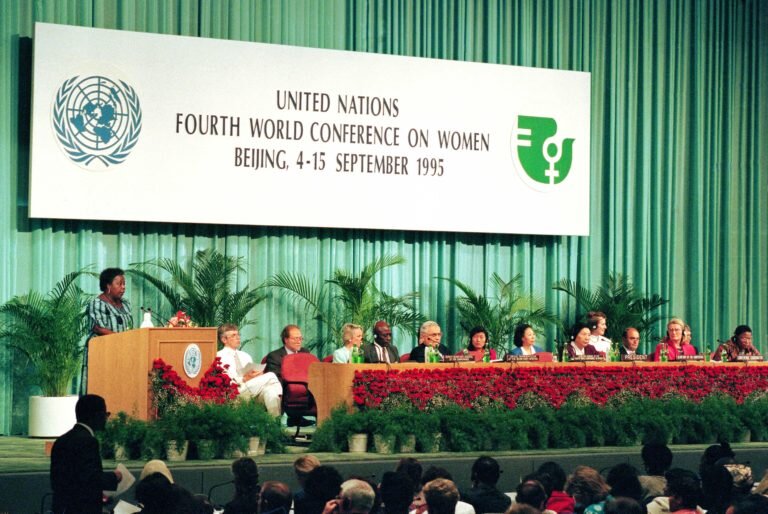Revisiting the historic Beijing conference
Editor’s Note: As this year’s CSW (Commission on the Status of Women) events had to be cancelled due to the threat of the coronavirus, we would still like to take the opportunity to commemorate the historic Beijing conference which would have been the focus of CSW64.
It has been 25 years since representatives from around the world participated in the United Nations Fourth World Conference on Women and adopted the Beijing Declaration and Platform for Action.
In remembrance of these events, we invite you to read the reflections and observations of Betsy Jones, then vice president of WFWP USA, who attended the conference in Beijing in 1995 (for reflections on the WFWPI-hosted event during these historic sessions, click here).
Credits: UN photo/Milton Grant
The UN conference in Beijing
The official UN conference in Beijing began midway through the NGO conference.
We had observer passes for this, so Mrs. Nora Spurgin, Christine Froelich and I spent one day in Beijing and witnessed over a monitor the beautiful opening ceremony with singing and acrobatic performances. China welcomed the conference with a tremendous display of talents and abilities.
Among the most inspiring of the speeches on the opening day was the one given by Benazir Bhutto, prime minister of Pakistan. She demonstrated a beautiful example of a woman leader, exhibiting very feminine characteristics mixed with a passionate desire to see change.
Mrs. Bhutto spoke of how touched she was to see women gathering from all continents in search of self-esteem, self worth, and self-respect. She talked about the practice of female infanticide in pre-Islamic Arabia, quoting a poem and said, "When a man was informed of the birth of a female child, his face would darken and he would be filled with grief. Should he retain it and suffer contempt, or bury it in the dust?" The girls who were not killed still grew up with emotional scars and burdens.
She said that even today girls are often abandoned or aborted. Boys often are wanted, and to please her husband, the wife wants a son. To keep her husband from abandoning her, a woman wants a son. She challenged participants to chart a course so that a climate can be created in which a girl child is as welcomed and valued as a boy child. This was one of her major points.
The Pakistani leader talked about her efforts to counter domestic violence. She is working to make it clear to people that domestic violence is a crime and that men can be punished for it. Sometimes a wife is killed by her husband or his relatives so that he can obtain another wife and get another dowry. She talked about her father, Zulfikar Ali Bhutto, the former prime minister of Pakistan who was killed by government opposition, saying, "If my father had not educated me and left me with independent financial means, I would not be able to be here today or sustain myself." She spoke with authority and expressed her great desire to commit her life to bringing more justice and equality in the world.
Meeting women from all over the world
Back at the NGO conference in Huairou, we attended presentations on all kinds of projects and topics. Attendees could choose from presentations such as the promotion of rights and responsibilities among youth, women's rights as human rights, the Development Coordination
Network Committee, the situation of women in Iraq, the Art and Cultural Technology Friendship Ambassadors Foundation, and violence against women in the United States. Presentations were given by so many groups, and every presentation was open to all participants.
I attended several and so did the others. One was on the mothers' centers that were established in Germany, after research found that mothers needed a place to go to exchange ideas. In America there are child care centers where parents drop off their children, but in Germany they have over 300 mothers' centers where women gather to exchange ideas and listen to each other. They pay women a small amount to sponsor activities at the center for other women.
On a sightseeing trip to the Great Wall, I met a lady who gave me a pamphlet about the situation in her city in India. During the 1970s there had been several incidents of mass rape, and a women's union was set up to oppose such atrocities. The pamphlet described the current situation and indicated how far the women have come.
It was touching to realize that some women had come to the conference from all over the world at great cost to themselves to work on these problems. We have to be aware of what the problems are and be concerned about how to support all of these very important efforts. At one workshop on healing, women were sharing and delighting each other with some special song, story or dance, or relating something they learned at a conference, as a way of projecting themselves.
At another seminar the leader said, "Let's go against the way things are and reverse everything." She wanted to let everyone in the room share, starting with the Chinese women and others from extremely difficult backgrounds, not calling on the American women until last. Some people spoke about how they came from very poor families, and had no education but somehow, by God's grace, someone sent them to this conference. I was very touched.
In America, women's conferences tend to draw participants from just the liberal side, but a lot of women came who really believe in moral values and family values. They were very committed and very dignified. Women were celebrating their womanhood, their color, and their beauty. Women came from Africa, India, the Philippines and other parts of the world; they are very family-oriented women, and they were there to represent those values. I felt proud to be part of such a program.

